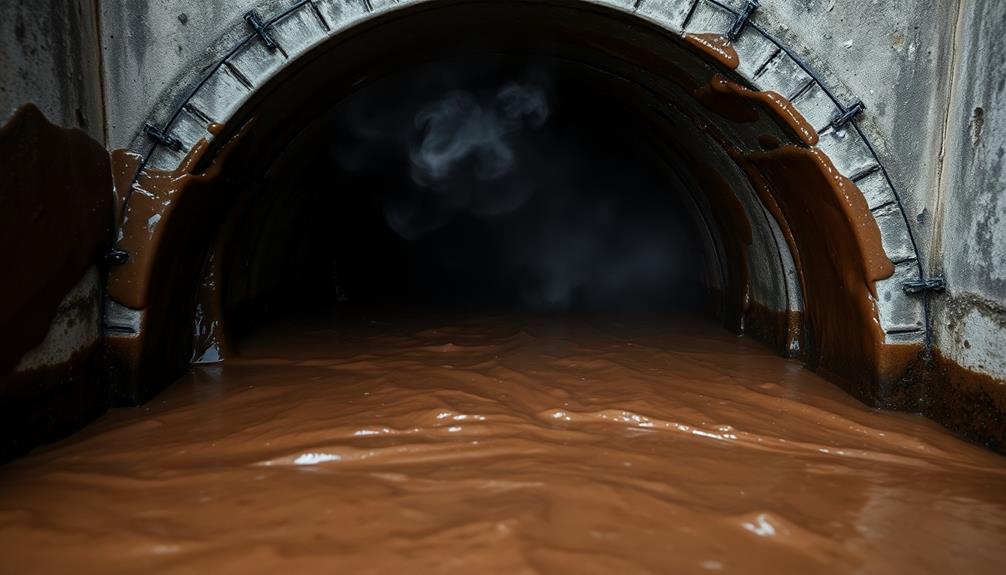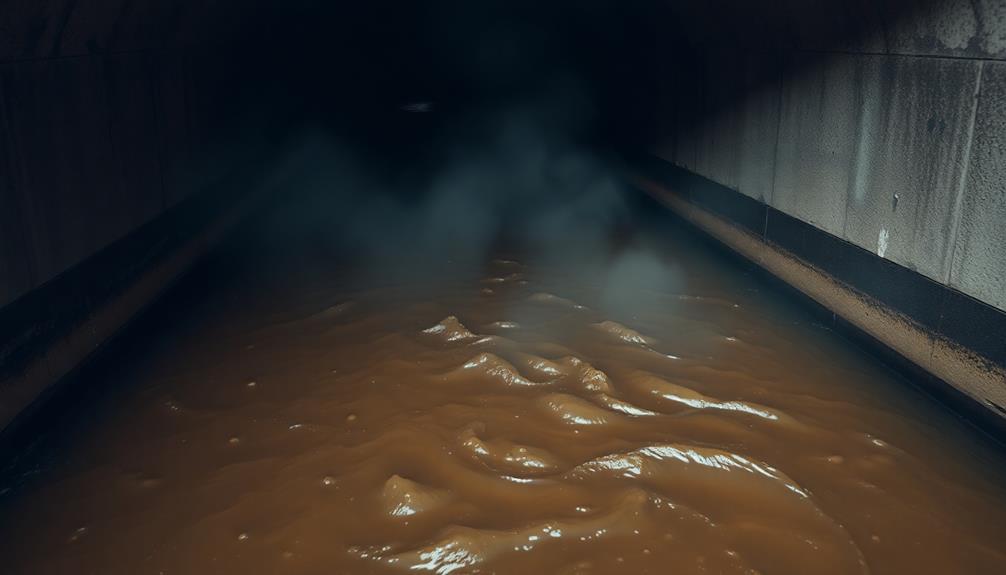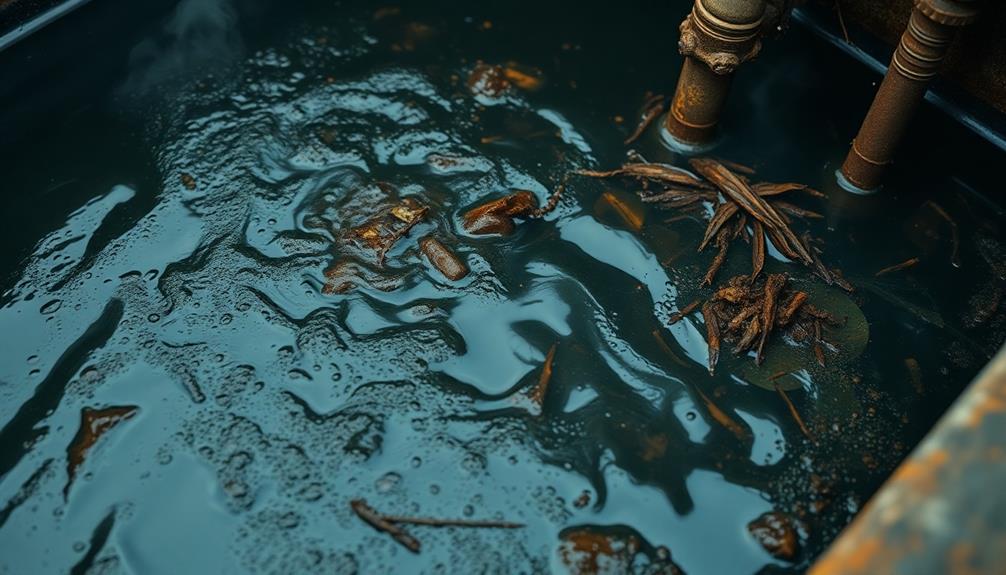Sewage smells like rotten eggs, and that's due to hydrogen sulfide gas. This unpleasant odor often means there's a plumbing issue to address, like a backed-up sewer line or a dry trap. In high concentrations, this smell can cause headaches and breathing difficulties, so it's important to take action quickly. You might notice it most in bathrooms and kitchens, especially if there's a clogged drain. Regular plumbing checks can help prevent these stinky situations. If you want to know more about keeping your home safe and odor-free, just keep going for more helpful tips!
Key Takeaways
- Sewage smell is often described as resembling rotten eggs, primarily due to hydrogen sulfide gas.
- It indicates potential plumbing issues like sewer line backups or dry traps, requiring immediate attention.
- Larger concentrations of sewage odor can pose serious health risks, including headaches and respiratory irritation.
- The smell arises from gases produced by decomposing organic matter, including methane, ammonia, and hydrogen sulfide.
- Quick action and regular plumbing maintenance are essential to prevent sewage smell and associated health hazards.
Introduction

Sewage smell is an unmistakable and unpleasant odor that can invade your home, often catching you off guard. This foul odor, often described as a rotten egg smell, mainly comes from hydrogen sulfide gas. In many cases, the odor can be a result of a plumbing issue or a dry drain trap, which allows the gas to escape into your home. Much like identifying spoiled salmon by smell, recognizing the presence of hydrogen sulfide gas is crucial for addressing the problem early. While the smell may seem overwhelming, it’s essential to locate the source quickly to prevent more significant damage or health concerns.
When you detect this distinct sewage smell, it's essential to pay attention. It can spread quickly, making it hard to ignore. While small amounts usually don't pose immediate health risks, large concentrations can lead to serious issues like headaches and breathing problems.
Recognizing the sewage smell is crucial for identifying the source. The odor often signals underlying plumbing issues, such as dry plumbing traps, sewer line leaks, or blockages.
It's vital to act fast because ignoring the smell can lead to bigger problems down the road. To keep your home safe, make sure to check your plumbing traps regularly.
If you notice a sewage smell, don't hesitate to investigate further. You might need to call a plumber to help resolve any plumbing issues.
Description of the Smell

The unmistakable stench of sewage often hits you like a wall when it escapes into your home. You might notice a foul odor that resembles rotten eggs, mainly because of hydrogen sulfide gas. This distinct smell can turn your living space into an unpleasant atmosphere, making everyone uncomfortable.
When sewer gas seeps into your house, it creates a sulfuric scent that's hard to ignore. If you smell sewage, don't brush it off. Small amounts might go unnoticed, but larger concentrations can pose serious health risks. That rotten egg smell indicates there could be plumbing issues, like dry traps or leaks in your plumbing system.
It's crucial to act quickly when you detect this odor, as it may signal a bigger problem, such as a sewer line backup. Ignoring persistent sewage odors can lead to hazardous conditions, so take it seriously. Identifying the source of the smell is your first step to resolving the issue.
Source and Composition

When sewage odors invade your space, it's essential to understand where they're coming from and what they consist of.
The smell of sewage mainly arises from a mix of gases produced by the decomposition of organic matter in wastewater. This includes methane, hydrogen sulfide, ammonia, and carbon dioxide.
Hydrogen sulfide is what gives sewage its distinct, rotten egg smell. It's highly recognizable and often off-putting.
While methane itself is odorless, it can be flammable in high concentrations, which adds to the potential hazards of sewer smells.
Ammonia contributes to the pungent, acrid odor that can irritate your eyes, nose, and throat if you're exposed for too long.
Typical Scenarios or Environments

In many homes, you'll often encounter sewage odors in specific areas like bathrooms and kitchens. The smell of sewer gas can be quite distinct, often described as a rotten egg odor. This unpleasant scent usually comes from common sources like clogged drains, damaged plumbing, or dry water traps in your plumbing fixtures.
Bathrooms, especially near toilets and sinks, are prime spots for these foul odors. If you notice a strong smell in a poorly ventilated space, it may indicate that the sewer gas concentration is building up. You might also find these odors in laundry rooms or even outdoors when septic systems malfunction or stormwater drainage issues arise after heavy rainfall.
To tackle the source of the smell, check your plumbing fixtures for clogs or dry traps. Regular maintenance can help prevent the buildup of sewer gas.
Emotional or Cultural Associations

Sewage smells evoke strong emotional responses, often triggering feelings of disgust and discomfort. When you catch a whiff of that foul odor, it can instantly remind you of uncleanliness and unsanitary conditions. The intensity of the scent often causes people to immediately try to escape the area or cover their noses in an effort to avoid it. In contrast, many are left wondering about more pleasant or historically cherished aromas, such as what frankincense and myrrh smell like—often described as warm, woody, and slightly sweet. These aromatic resins have been used for centuries in both spiritual and medicinal practices, evoking a sense of calm rather than the revulsion tied to the stench of sewage.
In many cultures, this sewage smell symbolizes moral corruption or societal decay, making you think about the deeper issues behind the odor. It's not just about what you smell; it's about what it represents.
You might feel negative emotions like aversion or unease, especially if you've encountered sewage in an unpleasant setting. This smell can also bring back memories of experiences that caused you emotional distress.
In some communities, the presence of a sewage smell highlights sanitation issues and public health concerns, often affecting marginalized groups more than others.
These associations can create discomfort, as you realize that sewage odors reflect deeper social inequities. It's essential to understand that the emotional reactions to sewage smells are tied to how we perceive our surroundings and the health of our communities.
Addressing these sanitation issues can improve not just public health, but also the emotional well-being of those affected.
Health or Safety Considerations

The pungent odor of sewer gas can pose serious health risks that shouldn't be ignored. When you smell it, take immediate action!
Sewer gas contains dangerous components like hydrogen sulfide and ammonia, which can lead to health issues. Prolonged exposure can cause headaches, dizziness, and respiratory irritation. High concentrations of hydrogen sulfide are particularly risky and could even result in respiratory failure or organ damage.
Ammonia exposure might irritate your eyes, nose, and throat, and if not addressed, it could result in long-term lung damage. Additionally, sewer gas is flammable, creating a significant safety risk. If it builds up in enclosed spaces, it can lead to fires or explosions.
To keep yourself safe, ensure that your plumbing systems are regularly maintained. This regular maintenance helps prevent leaks and reduces the chances of sewer gas leaks in your home.
If you notice that sewage smell, don't wait—ventilate the area and seek help to fix the problem. Remember, your health and safety are paramount, so always be proactive when it comes to sewer gas odors!
Final Thoughts

Addressing sewage smells promptly is essential for maintaining a safe and healthy environment in your home. When you notice a sewer gas odor, it often indicates serious plumbing issues that need your immediate attention. These smells, sometimes described as rotten eggs, can spread throughout your home and signal problems you shouldn't ignore.
Identifying the causes of these odors is crucial. Prolonged exposure can lead to health risks like headaches, dizziness, and even respiratory problems. If you detect these smells, don't wait! You can start with some home remedies, like pouring baking soda or vinegar down your drains, to help eliminate minor odors.
However, if the smell persists, it's wise to contact a professional for a thorough inspection. Ignoring sewage smells can lead to water damage and costly repairs down the line. So, take action quickly!
Frequently Asked Questions
What Are the Symptoms of Smelling Sewage?
If you smell sewage, you might experience headaches, dizziness, or nausea. Prolonged exposure could irritate your eyes and respiratory system, leading to coughing or shortness of breath. Take these symptoms seriously and seek fresh air.
Is It Safe to Stay in a House That Smells Like Sewer?
If your house smells like sewer, it's not safe to stay. You could face health risks from toxic gases. Better to leave and call a professional plumber to address the underlying plumbing issues urgently.
How Do You Find the Smell of Sewage?
To find the smell of sewage, start by checking areas near toilets and sinks. Look for leaks, dry traps, or standing water. You might also consider using smoke tests to identify hidden cracks in sewage lines.
What Does Sewage Sludge Smell Like?
Sewage sludge smells overwhelmingly foul, often like rotten eggs mixed with decaying matter. You'll notice the intensity varies with temperature and moisture, and in poorly ventilated spaces, the odor can become particularly strong and unsettling.









